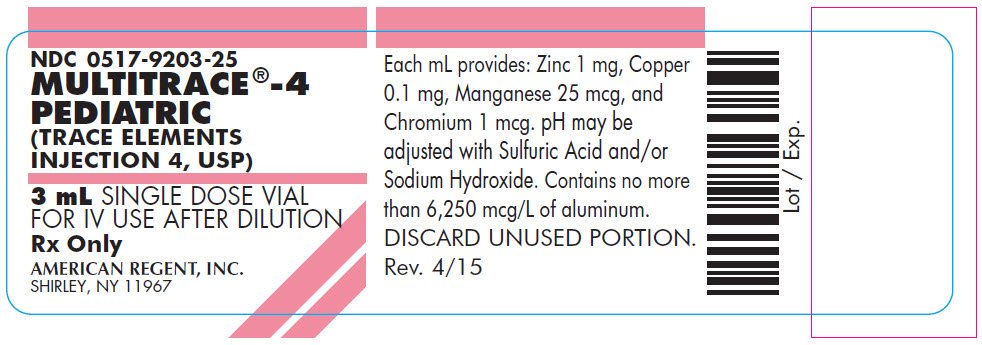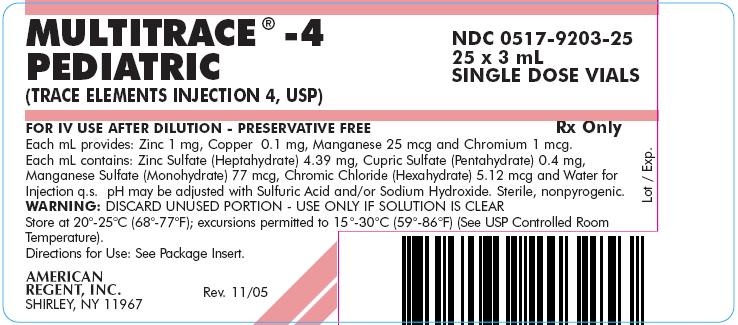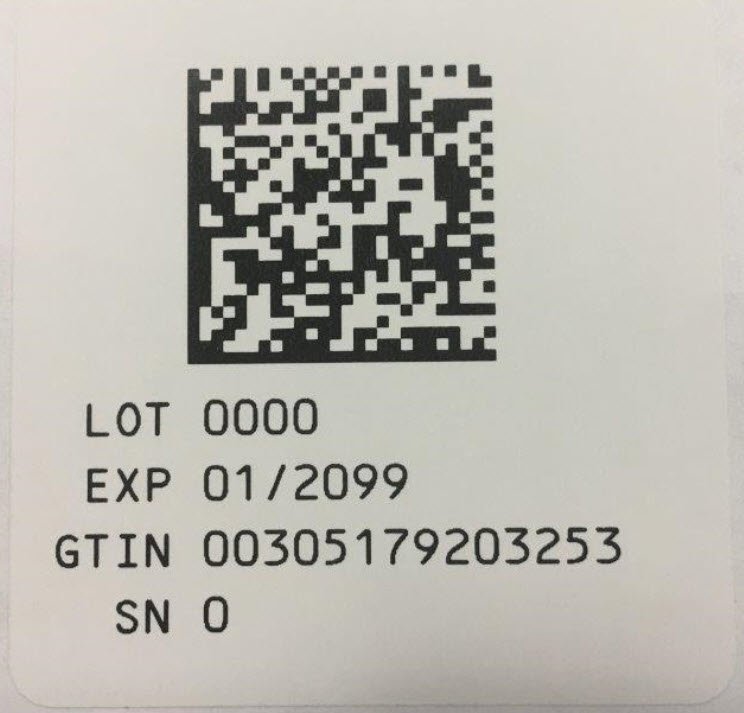Multitrace-4 Pediatric: Package Insert / Prescribing Info
Package insert / product label
Generic name: trace elements
Dosage form: injection, solution, concentrate
Drug class: Intravenous nutritional products
Medically reviewed by Drugs.com. Last updated on Apr 19, 2024.
On This Page
Multitrace-4 Pediatric Description
MULTITRACE® - 4 PEDIATRIC (TRACE ELEMENTS INJECTION 4, USP) is a sterile, nonpyrogenic solution containing four Trace Elements for use as an additive for Total Parenteral Nutrition (TPN).
Each mL provides: Zinc 1 mg, Copper 0.1 mg, Manganese 25 mcg and Chromium 1 mcg. Each mL contains: Zinc Sulfate Heptahydrate 4.39 mg (equivalent to 1 mg Zinc); Cupric Sulfate Pentahydrate 0.4 mg (equivalent to 0.1 mg Copper); Manganese Sulfate Monohydrate 77 mcg (equivalent to 25 mcg Manganese); Chromic Chloride Hexahydrate 5.12 mcg (equivalent to 1 mcg Chromium); and Water for Injection, q.s. pH of the solution may have been adjusted with sulfuric acid and/or sodium hydroxide. Preservative Free.
Multitrace-4 Pediatric - Clinical Pharmacology
ZINC has been identified as a cofactor for over 70 different enzymes, including carbonic anhydrase, alkaline phosphatase, lactic dehydrogenase and both RNA and DNA polymerase. Zinc facilitates wound healing, helps maintain normal growth rates, normal skin hydration and senses of taste and smell.
Providing zinc during TPN prevents development of the following deficiency symptoms: Parakeratosis, hypogeusia, anorexia, dysosmia, geophagia, hypogonadism, growth retardation and hepatosplenomegaly. At plasma levels below 20 mcg zinc/100 mL, dermatitis followed by alopecia has been reported for TPN patients.
COPPER is essential as a cofactor for serum ceruloplasmin, an oxidase necessary for proper formation of the iron carrier protein, transferrin. Copper also helps maintain normal rates of red and white blood cell formation. Scorbutic type bone changes seen in infants fed exclusively with copper-poor cow's milk are believed due to decreased activity of ascorbate oxidase, a cuproenzyme.
Providing copper during TPN prevents development of the following deficiency symptoms: leukopenia, neutropenia, anemia, depressed ceruloplasmin levels, impaired transferrin formation and secondary iron deficiency.
MANGANESE is an activator for enzymes such as polysaccharide polymerase, liver arginase, cholinesterase and pyruvate carboxylase.
Providing manganese during TPN prevents development of the following deficiency symptoms: nausea and vomiting, weight loss, dermatitis, and changes in growth and color of hair.
CHROMIUM (trivalent) is part of glucose tolerance factor, and activator insulin-mediated reactions. Chromium helps to maintain normal glucose metabolism and peripheral nerve function.
Providing chromium during TPN prevents development of the following deficiency symptoms: impaired glucose tolerance, ataxia, peripheral neuropathy, and a confusional state similar to mild/moderate hepatic encephalopathy.
Indications and Usage for Multitrace-4 Pediatric
This formulation is indicated for use as a supplement to intravenous solutions given for TPN for children up to 11 years of age. Administration of the solution in TPN solutions helps to maintain plasma levels of zinc, copper, manganese, and chromium and to prevent depletion of endogenous stores of these trace elements and subsequent deficiency symptoms.
Contraindications
MULTITRACE® - 4 PEDIATRIC should not be given undiluted by direct injection into a peripheral vein because of the potential of infusion phlebitis.
Warnings
Copper and Manganese are eliminated via the bile. In patients with severe liver dysfunction and/or biliary tract obstruction, decreasing or omitting copper and manganese supplements entirely may be necessary.
This product contains aluminum that may be toxic. Aluminum may reach toxic levels with prolonged parenteral administration if kidney function is impaired. Premature neonates are particularly at risk because their kidneys are immature, and they require large amounts of calcium and phosphate solutions, which contain aluminum.
Research indicates that patients with impaired kidney function, including premature neonates, who receive parenteral levels of aluminum at greater than 4 to 5 mcg/kg/day accumulate aluminum at levels associated with central nervous system and bone toxicity. Tissue loading may occur at even lower rates of administration.
Precautions
Before administering MULTITRACE® - 4 PEDIATRIC in TPN solutions, the physician must assess the metabolic requirements for trace elements and disease state of the patient. Frequent determinations of serum levels of the various trace elements are suggested as a guideline for adjusting the dosage or completely omitting the solution. ZINC is eliminated via the intestine and kidneys. The possibility of retention should be considered in patients with malfunctioning excretory routes. COPPER and MANGANESE are eliminated via the bile, therefore, the possibility of the retention of these elements should be considered in patients with biliary obstruction. Ancillary routes of MANGANESE excretion, however, include pancreatic juice, or reabsorption into the lumen of duodenum, jejunum, or ileum.
In assessing the contribution of CHROMIUM supplements to maintenance of normal glucose homeostasis, consideration should be given to the possibility that the patient may be diabetic, in which case oral or intravenous antidiabetic medication may be indicated.
Adverse Reactions/Side Effects
The amounts of ZINC, COPPER, MANGANESE, AND CHROMIUM in the solution are very small and toxicity symptoms due to these trace elements at suggested dosage levels are considered unlikely to occur.
Overdosage
Symptoms of ZINC overdose resulting from oral ingestion of Zinc Sulfate in large amounts have resulted in death. Symptoms included nausea, vomiting, dehydration, electrolyte imbalances, dizziness, abdominal pain, lethargy and incoordination. Single intravenous doses of 1 to 2 mg zinc/kg body weight have been given to adult leukemia patients without toxic manifestations. Normal plasma levels for Zinc vary from approximately 88 to 112 mcg/100 mL. Plasma levels sufficient to produce symptoms of toxic manifestations are not known. Calcium supplements may confer a protective effect against Zinc toxicity.
Symptoms of COPPER toxicity reported in literature include prostration, behavior change, diarrhea, progressive marasmus, hypotonia, photophobia and peripheral edema. D-penicillamine has been reported effective as an antidote.
MANGANESE toxicity has not been reported in patients receiving TPN. Neither have reports of manganese toxicity from excessive intake in foods and/or beverages been published.
Symptoms of CHROMIUM toxicity include nausea, vomiting, ulcers and gastrointestinal tract, renal and hepatic damage, and abnormalities of the central nervous system culminating in convulsions and coma. Trivalent Chromium administered intravenously to TPN patients has been shown to be nontoxic when given at dosage levels up to 250 mcg/day for two consecutive weeks.
Multitrace-4 Pediatric Dosage and Administration
Each mL of the solution provides Zinc 1 mg, Copper 0.1 mg, Manganese 25 mcg, and Chromium 1 mcg, and is administered intravenously only after dilution to a minimum of 1:200. The suggested dosage ranges for the four trace elements are:
ZINC: For full term infants and children, 100 mcg zinc/kg/day is recommended. For premature infants (birth weight less than 1500 g) up to 3 kg in body weight, 300 mcg zinc/kg/day is suggested.
COPPER: For pediatric patients, the suggested additive dosage level is 20 mcg copper/kg/day. The normal plasma range for copper is approximately 80 to 160 mcg/100 mL.
MANGANESE: For pediatric patients, a dosage level of 2 to 10 mcg manganese/kg/day is recommended.
CHROMIUM: For pediatric patients, the suggested additive dosage level is 0.14 to 0.20 mcg/kg/day.
Periodic monitoring of plasma levels of Zinc, Copper, Manganese, and Chromium is suggested as a guideline for administration.
Aseptic addition of MULTITRACE® - 4 PEDIATRIC to parenteral nutrition solutions under a laminar flow hood is recommended. The trace elements present in MULTITRACE® - 4 PEDIATRIC are physically compatible with the electrolytes and vitamins usually present in parenteral nutrition formulations.
Do not directly mix ascorbic acid injection with copper or selenium containing parenteral products in the same syringe or vial, as this admixture may cause the formation of an insoluble precipitate.
Parenteral drug products should be inspected visually for particulate matter and discoloration prior to administration, whenever solution and container permit.
Store at 20°-25°C (68°-77°F); excursions permitted to 15°-30°C (59°-86°F) (See USP Controlled Room Temperature).
How is Multitrace-4 Pediatric supplied
MULTITRACE®- 4 PEDIATRIC (TRACE ELEMENTS INJECTION 4, USP)
Each mL provides: Zinc 1 mg, Copper 0.1 mg, Manganese 25 mcg, and Chromium 1 mcg.
NDC 0517-9203-25 3 mL Single Dose Vial Packaged in boxes of 25
AMERICAN
REGENT, INC.
SHIRLEY, NY 11967
IN9203
Rev. 8/18
PACKAGE LABEL.PRINCIPAL DISPLAY PANEL
Container
NDC 0517-9203-25
MULTITRACE -4 PEDIATRIC
(TRACE ELEMENTS INJECTION 4, USP)
3 mL SINGLE DOSE VIAL
FOR IV USE AFTER DILUTION
Rx Only
AMERICAN REGENT, INC.
SHIRLEY, NY 11967

Carton
MULTITRACE -4 PEDIATRIC
(TRACE ELEMENTS INJECTION 4, USP)
NDC 0517-9203-25
25 x 3 mL
SINGLE DOSE VIALS
FOR IV USE AFTER DILUTION - PRESERVATIVE FREE
Rx Only
Each mL provides: Zinc 1 mg, Copper 0.1 mg, Manganese 25 mcg and Chromium 1 mcg. Each mL contains: Zinc Sulfate (Heptahydrate) 4.39 mg, Cupric Sulfate (Pentahydrate) 0.4 mg, Manganese Sulfate (Monohydrate) 77 mcg, Chromic Chloride (Hexahydrate) 5.12 mcg and Water for Injection q.s. pH may be adjusted with Sulfuric Acid and/or Sodium Hydroxide. Sterile, nonpyrogenic.
WARNING: DISCARD UNUSED PORTION - USE ONLY IF SOLUTION IS CLEAR.
Store at 20°-25°C (68°-77°F); excursions permitted to 15°-30°C (59°-86°F) (See USP Controlled Room Temperature).
Directions for Use: See Package Insert.
AMERICAN
REGENT, INC.
SHIRLEY, NY 11967
Rev. 11/05

| MULTITRACE -4 PEDIATRIC
trace elements 4 injection, solution, concentrate |
||||||||||||||||||||
|
||||||||||||||||||||
|
||||||||||||||||||||
|
||||||||||||||||||||
|
||||||||||||||||||||
|
||||||||||||||||||||
| Labeler - American Regent, Inc. (002033710) |
| Establishment | |||
| Name | Address | ID/FEI | Business Operations |
|---|---|---|---|
| American Regent, Inc. | 002033710 | ANALYSIS(0517-9203) , MANUFACTURE(0517-9203) , STERILIZE(0517-9203) | |
More about Multitrace-4 Pediatric (trace elements)
- Check interactions
- Compare alternatives
- Pricing & coupons
- Dosage information
- Drug class: intravenous nutritional products
Professional resources
Other brands
Multitrace-4, Multitrace-4 Concentrate, Multitrace-4 Neonatal, Peditrace

